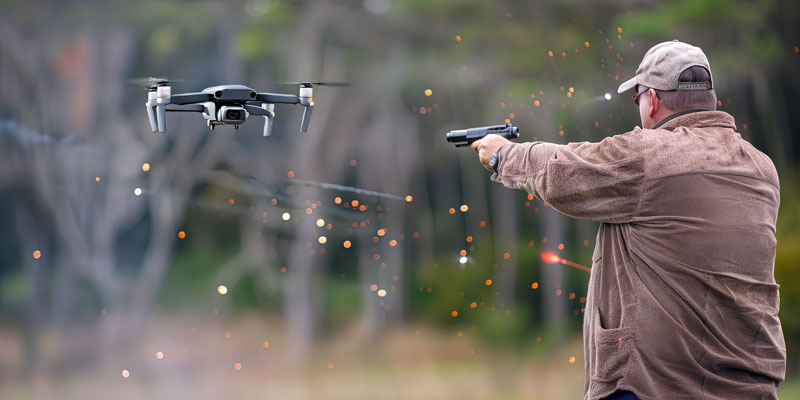The demand for aerial drone photography and video services in Chattanooga has grown rapidly in recent years. From real estate marketing to event coverage and commercial inspections, drones provide incredible value to businesses and individuals alike. But despite their benefits, some people mistakenly believe they have the right to shoot at or throw objects at drones flying near their property.
This is a dangerous misconception. Interfering with a drone is illegal, unsafe, and comes with serious consequences. Below, we’ll break down the laws, risks, and smarter alternatives for anyone concerned about drones.
Can You Legally Shoot at a Drone?
The short answer is no. Tampering with a drone — whether by firing a gun, throwing objects, or using signal jammers — is against federal law. Drones are classified as aircraft under Federal Aviation Administration (FAA) regulations, and interfering with them is treated the same as interfering with manned aircraft.
Federal Offenses – Under 18 U.S. Code § 32, it is a felony to damage, disable, or attempt to destroy an aircraft, including drones. Violations can result in heavy fines and prison time.
FAA Regulations – The FAA manages U.S. airspace, including drones. Any action that endangers a drone is treated as a threat to aviation safety.
Tennessee Laws – On top of federal rules, Tennessee’s property and criminal codes can apply. Shooting at a drone could bring charges such as reckless endangerment or destruction of property.
Criminal and Civil Penalties
Choosing to attack a drone can leave you facing long-lasting consequences:
Felony Charges – Because drones are classified as aircraft, shooting one down could mean serious federal charges.
Civil Lawsuits – Drone owners can sue for damages, which often include the cost of expensive equipment and lost footage.
Financial Restitution – Courts can require those convicted to pay thousands of dollars in fines and compensation.
Permanent Record – A felony conviction follows you for life, potentially limiting career and housing opportunities.
Safety Dangers of Shooting at Drones
Aside from legal issues, trying to disable a drone can put others in harm’s way:
Risk of Injury – A drone that falls from the sky can land unpredictably, endangering people below.
Property Damage – Crashed drones can hit cars, rooftops, or power lines, creating expensive damage.
Gun Safety Risks – Firing a weapon at the sky is never safe; stray bullets can easily injure neighbors or damage buildings.
Safer Ways to Handle Drone Concerns
If you believe a drone is flying unlawfully over your property in Chattanooga or nearby communities like Signal Mountain, Lookout Mountain, or Ooltewah, there are proper steps to take:
Locate the Pilot – In many cases, drone operators are flying legally and with FAA approval. A simple conversation may resolve concerns.
Report to Authorities – If you suspect misuse, notify local law enforcement or file a report with the FAA’s complaint system.
Know Your Rights – Privacy matters. If you feel a drone is violating your rights, consult with a legal professional for guidance.
The Bottom Line
Shooting at a drone is not only illegal but also reckless. Federal law classifies drones as aircraft, and tampering with them can bring felony charges, financial penalties, and serious safety hazards. The smarter, safer approach is to report concerns through proper legal channels.
Professional Drone Services in Chattanooga
At Gig City Drones, we operate with full FAA certification, proper insurance, and a commitment to safe, responsible flying. Our team understands community concerns and takes pride in providing trusted aerial drone photography and videography services in Chattanooga and surrounding areas.
Whether you need breathtaking real estate footage, high-quality aerial video for marketing, or commercial inspections done with precision, Gig City Drones is here to help.
Call us today at [insert phone number] or email [insert email] to learn more about our professional drone services in Chattanooga.
We are dedicated to capturing the Scenic City from above while promoting safety, compliance, and community trust.

